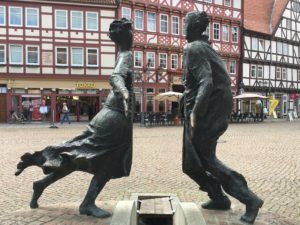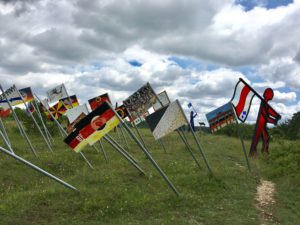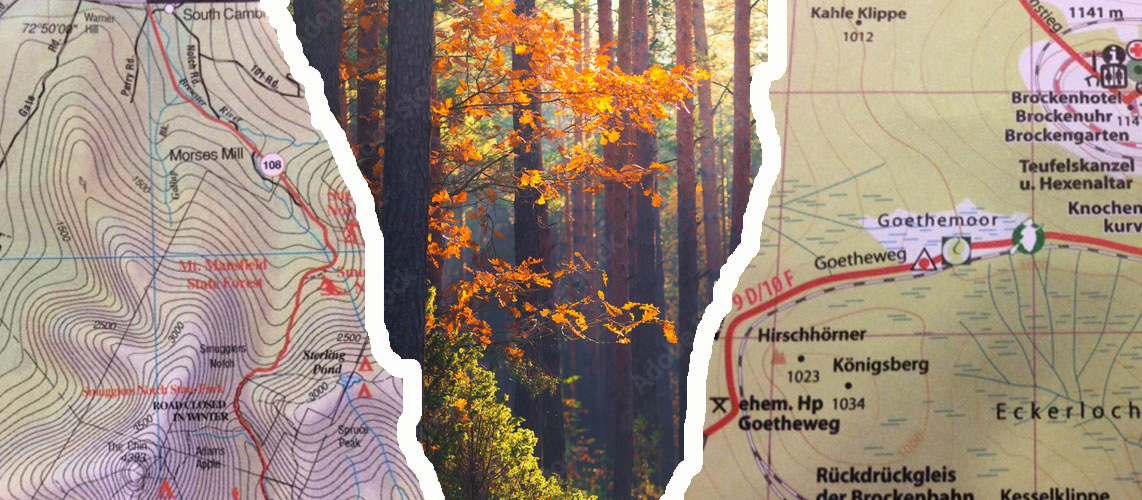
For most of her sixteen years as German chancellor, Angela Merkel said little about her East German past. After the surprise of her meteoric political career in the newly reunited country – a woman! An Easterner! – things quieted down for a while. By the time she became chancellor in 2005, the major challenges of integrating two vastly different economic systems seemed to have been overcome. The apparent need for Germans from east and west to slot each other as “Besserwessis” (western know-it-alls) and “Jammerossis” (whining easterners) seemed to abate. “East” and “West” were regaining their geographical, rather than geopolitical, meanings.

(DVD cover)
When Germany hosted the Soccer World Cup in 2006, the country exuded a mood of openness and optimism. Though not much into watching soccer myself, I felt buoyed by the lighthearted atmosphere, which was captured in a documentary film (“Germany. A Summer Fairy-Tale”) that premiered on October 3 of that year.
Unlike the national holidays of many other countries, Germany’s goes back to a fairly recent event: the day the country officially reunited, on October 3, 1990, after forty years of being split in two.
Angela Merkel chose that day in 2021, the thirty-first Day of German Unity and her last as chancellor, to share something personal about the meaning of that day.

She began by reminding the country that the Fall of the Berlin Wall in 1989 and Reunification in 1990 did not simply happen: that it was courageous East German citizens who, at great personal risk, brought about a peaceful transformation. “We must never forget that it could have ended differently,” that the protesters did not know whether they would get shot at or disappear in Stasi prisons. Their own government had, after all, praised the “Chinese solution” only a few months before, when the protests in Beijing’s Tiananmen Square were brutally put down.
History, in other words, is not preordained.
Reflecting on the meaning of those dramatic events, Merkel spoke of her own experience of life under a one-party dictatorship, of the lack of freedom, the fear of being spied on by the secret police – and of the high value democracy and the end of the German division hold for her.
Then Merkel turned her attention to more recent events. To the hate apparent in attacks on people because of their perceived ethnic origin, their faith, or their opinions, even on people who work for the common good – EMTs, firefighters, local politicians. “Sometimes, I fear, we take our democratic achievements for granted; we treat them recklessly.” she said. Differences, she said, are not a danger to democracy but an expression of lived freedom: “We are allowed to…pursue our ideas of happiness however they do us good, as long as we pursue them on the basis of our constitution.”
This, she said, is a matter of how we hold together as a society. “We must honestly ask ourselves how we relate to each other, how much respect we muster for each other.”

From here Merkel made a remarkable segue to her second point about life with an East German past, not just her own but that of more than sixteen million others. For the first time in her public life, she noted that from a western perspective, the pre-Unification lives of eastern Germans are often discounted or treated as baggage that makes them less than complete citizens. She pointed out how Reunification brought little change to the everyday lives of West Germans, whereas for easterners, everything changed: the political system, their work lives, how society was organized.
As surprised as I was to hear Angela Merkel speak about this, I was not surprised by what she described. By the time of her Day of Unity speech, I had spent several years talking to eastern Germans, noticing echoes of the division, and adjusting my western-socialized views. Many felt that western Germans seemed to associate East Germany only with the Stasi and constant shortages of bananas, as if the people who lived there did not also have professional lives, friendships, gardens, or favorite books. As if nothing of interest or importance had happened in the lives of East Germans.
In my own conversations, I sometimes wondered how people were able to withstand the sheer stress of these opposing realities. I had also learned about the way many had pushed the envelope, seeking out or creating pockets of freedom and resistance. One such pocket was the Protestant Church (in which Merkel’s father was a pastor); others were individual acts of civil disobedience.
Reflecting on October 3, 1990, some of my conversation partners mentioned that what took place on that day was not truly a Reunification of equals but an accession of the GDR (East Germany) to the Federal Republic (West Germany). To westerners this may seem like a formality; for easterners, combined with the subsequent shock of massive unemployment, a decreasing but still present income differential of about 10%, and the persistent scarcity of easterners in leadership positions, it can add to a sense of being second-class citizens.
To illustrate the discounting of eastern biographies, Merkel gave the example of a 2020 newspaper article, in which a journalist referred to her as “not a born, but a newly trained citizen of the Federal Republic of Germany.” Describing Merkel in this way seems especially incongruous in light of the way she grew up. She describes how in her family, West German political affairs were regularly discussed around the dinner table; how as an eight-year-old, she knew the names of all the West German government ministers. And from early on in her political career, Merkel was noted by her international conversation partners as someone with a remarkable curiosity, always asking how their societies worked and how they saw the world.

As Merkel noted in her speech, the lingering east-west divide is not the only one tearing at the fabric of German society. Many of the other rifts, in fact, are tearing at American society, too: between people with different political opinions, different educational background, residents of rural and urban areas. While the U.S. was not in recent history divided by an actual militarized border, many are concerned that a new civil war is on the horizon. Some, like historian Manisha Sinha, say that the Civil War that already happened never truly ended, that old enmities are bubbling up. And unlike in the time of the Peaceful Revolution, social media tends to sort us into like-minded bubbles, often without our awareness.
Which makes Merkel’s appeal to her German audience even more relevant to my second country, which I think of these days as the not-so-United States. Whether we agree with her political views or decisions, we would do well to “honestly ask ourselves how we relate to each other, how much respect we muster for each other.”
Perhaps we could even use Merkel as an example and approach a fellow citizen with curiosity, ideally one with whose political opinions we differ. Ask them a question about their views or their life. This may require some courage, though probably not nearly as much as the East German revolutionaries had to muster.
A shorter version of this was published in the Montpelier Times-Argus


Good article. Thank you Kerstin. I learned a lot.
Thank you Shahbakhti!
“Differences are not a danger to democracy but an expression of lived freedom”. Nicely said, we all have a shared humanity while also having diverse experience and perspectives.
So true, and also well said! Thanks Eric!